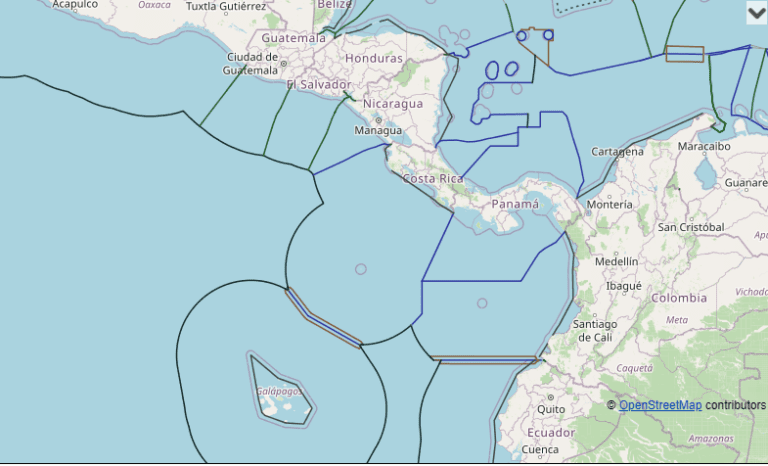Costa Rica is commonly recognized for its nature, diverse wildlife, and stunning beaches. This country’s natural beauty is not a coincidence; the Costa Rican government puts significant effort into protecting not only wildlife and nature but also the ocean and its surroundings.
According to Maritime-Terrestrial Zone Law N°6043, “the maritime-terrestrial zone is the strip of two hundred meters wide along the Atlantic and Pacific coasts of the Republic, whatever its nature, measured horizontally from the ordinary high tide line and the land and rocks left uncovered by the sea at low tide.” It also clarifies that this zone includes islands, islets, maritime rocks, and any land or natural formation surrounded by the ocean except for Coco’s Island and Peninsula Papagayo, which have their regulations.
The responsibility of ensuring compliance with the regulations established by this law falls upon the Costa Rican Tourism Institute (ICT), duly accompanied by the corresponding Municipalities, which must ensure law application regarding the domain, development, and use of the maritime terrestrial zone.
While many foreign investors are looking to purchase beachfront properties to enjoy a “pura vida” lifestyle or to initiate their planned developments, it is fundamental to ensure good professional advice. It is essential to acknowledge that the maritime-terrestrial zone is divided into two:
- Public zone: a strip fifty meters wide from the ordinary high tide and the areas uncovered during low tide. Costa Rican beaches cannot be declared private property or be claimed as ownership rights. Also, public access and transit must always be granted, and any development or construction not previously authorized by the law and the Maritime-Terrestrial Zone Law Regulations will not be allowed.
- Restricted zone: consists of the remaining one hundred and fifty meters. The possibility of this land being built depends on the existence of regulatory plans or concessions. The law prohibits cutting trees, littering, modifying the land’s topography, or carrying out any action that alters the ecological balance of the site without proper authorization.
Municipalities can grant concessions only in the restricted zones corresponding to the maritime-terrestrial zone of their jurisdiction. The Regulation to the Law on the Maritime-Terrestrial Zone defines a concession as the “authorization provided by the competent authority for the enjoyment or use of the maritime terrestrial zone of a public domain.” This authorization is for a specific period and under regulated terms and conditions. Therefore, it differs from a fee-simple titled property, which is an irrevocable ownership of land and its constructions.
If the Municipality grants the concession in a zone declared as a tourist area, the concession might receive the approval of the Costa Rican Tourism Institute. Otherwise, concessions provided in any other maritime-terrestrial zone might receive approval from the Land and Colonization Institute. These institutes might not deny the concession unless they are proven to contravene the law or if they offer a clear and reasoned refusal.
Any person or CR legal entity interested in developing land in the maritime-terrestrial zone might request the concession declaration from the corresponding Municipality. This consists of a way to develop land situated in the restricted maritime-territorial zone legally; concessions will be provided for the use and enjoyment of the area under the conditions established by law. Costa Rican regulation contemplates a list of cases that are not subject to receiving a concession, among them:
- Foreigners who have resided in the CR for less than five years.
- CR Corporations with bearer shares.
- Companies or entities domiciled abroad.
- Entities incorporated in the country only by foreigners.
- Entities whose shares, quotas, or capital are owned in more than fifty percent by foreigners that have resided in CR for less than five years.
It is essential to clarify that foreigners can be subject to a concession by owning a maximum of 49% of the shares or quotas of a concessionary CR corporation.
Some relevant information that every person interested in acquiring a concession must acknowledge:
- The term for concessions consists of a minimum of five years and a maximum of twenty years, and it can be renewed for another term; it is advisable to start the renewal process six months before the term ends.
- Every beneficiary of a concession must comply with the monetary obligations contracted with the corresponding Municipality, which includes a cannon to be paid yearly and the corresponding taxes.
- Suppose the concession’s beneficiary wants to build or develop a project or a business within the concession. In that case, it must comply with all regulations the Municipality and ICT applies to where the concession belongs.
- Concessions are not subject to assignment, transfer, or annotation without the Municipality and the corresponding institution’s previous and written authorization.
Costa Rica offers immense potential for touristic developments; however, adherence to maritime-terrestrial zone regulations is essential. Obtaining the proper legal assistance to develop beachfront properties in Costa Rica will ensure a legal, sustainable, and responsible development of Costa Rican beaches. This will lead to successful projects while preserving this country’s beauty and nature.
We at GM Attorneys will be pleased to help you with legal matters in Costa Rica! You can contact us at info@gmattorneyscr.com or visit our website and blog section at https://www.gmattorneyscr.com/gm_website/html/blog.php







